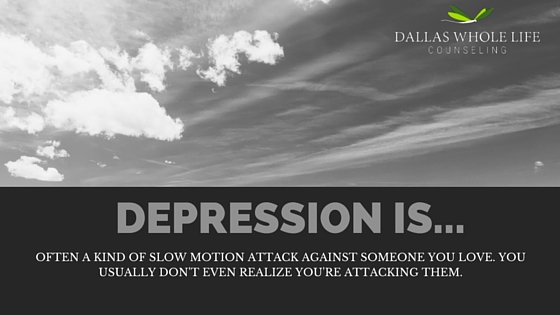A depressed person doesn’t necessarily perceive herself as an angry person. To some extent, you could say a depressed person is “angry at himself.” But this is only part of the story. When I work with a depressed client, I often ask her: Who are you depressed at?
Suppose you lose your job and you sink into depression. Maybe you’re angry at your boss for firing you. Maybe you’re angry with yourself for poor job performance. But these are feelings you are aware of. With depression, the most problematic feelings are those you likely don’t recognize.
Ask yourself this question: If you’ve lost your job, who do you express your negative feelings toward? To whom do you “vent” about your unemployment? And who, other than you, is inconvenienced by your job loss? Does your spouse have to work longer hours to compensate? Do your parents have to give you a loan?
Depression is often a kind of slow motion attack against someone you love. You usually don’t even realize you’re attacking them. A depressed person often has to get in touch with their anger before they can work through their depression. Maybe you’re deeply angry with your spouse or parents, even though you feel don’t have a “right” to be. Your depression can be a way of hurting others without admitting to yourself that you are angry.
And feeling guilty about being angry gets you nowhere. It only makes you more depressed. If you’re angry, you’re angry. Doesn’t make you right or wrong–just angry. Recognizing your anger directly and working through it head-on addresses the deeper roots of depression rather than just treating the symptoms.
About the Author: James Robbins is a licensed professional counselor, published author and co-owner of Dallas Whole Life Counseling. He has over 15 years of experience helping people in various life stages that come from a wide variety of cultural, economic and family backgrounds. Learn more about his background by clicking here.


 by
by 
Leave a Reply
You must be logged in to post a comment.